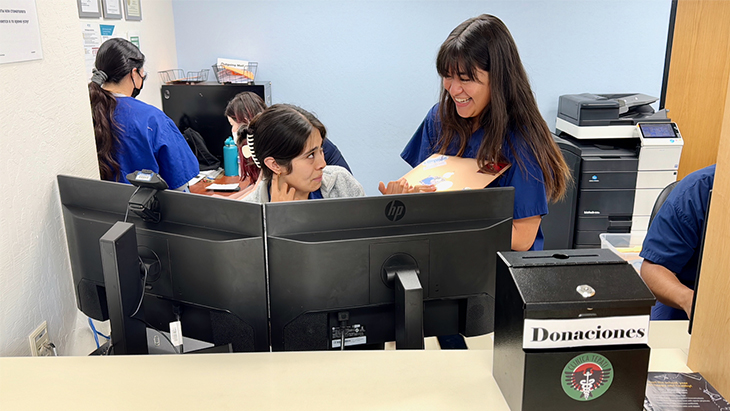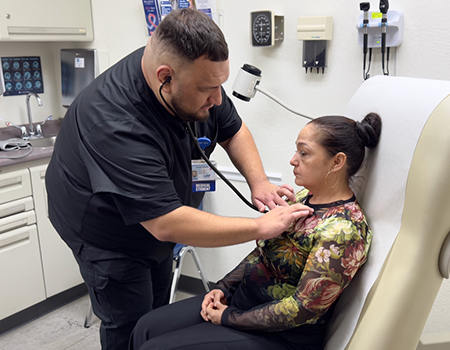Erasmo Rivera is a 48-year-old maintenance worker in Sacramento. He has no health insurance and used to become anxious whenever her or his wife got sick.
One time, his wife was charged $7,000 for a hospital emergency room visit to treat a spider bite, a bill that ended up with a collection agency. Another time, he struggled to pay $160 to see a doctor in a community health center.
But then he discovered Clínica Tepati — the free clinic affiliated with the UC Davis School of Medicine. The clinic in midtown Sacramento is run by student volunteers and aided by physician volunteers. Many of them, like Rivera, speak fluent Spanish. “They treat me really good here,” he said at a recent appointment. “It’s been a good experience.”
Since it was founded in 1974, Tepati has been a lifeline for tens of thousands of local residents who are uninsured or underinsured, and who appreciate being cared for by providers who understand their culture or language.
About 40 undergraduate students, six medical students and several physicians care for patients every Saturday at Clínica Tepati.Tepati has also been an important training ground for thousands of students from the UC Davis School of Medicine in Sacramento and undergraduate students from the Davis campus. In recent years, the UC Davis volunteers have been joined by pharmacy students from University of the Pacific, medical students from California Northstate University and physician assistant students from the Betty Irene Moore School of Nursing at UC Davis.
“For many of our students, their first experience caring for patients was at Clínica Tepati or another of our student-run affiliated clinics early in their medical education,” said Susan Murin, interim dean of the UC Davis School of Medicine. “We are proud of our students’ deep commitment to health equity and passion for improving the lives of everyone in our community.”
More than 800 patients visited the clinic in 2023.
Clinic meets a community needThe UC Davis School of Medicine had only been open a few years when a group of students and faculty in the early 1970s sought to reduce barriers to health care for a vulnerable segment of Latinos in and around Sacramento.
Some of the students were motivated by the Chicano rights movement, a social and political effort to improve the lives of Mexican Americans.
They met with the UC Davis Department of Family and Community Medicine, undergrads from UC Davis and community members to create the primary care clinic with a culturally relevant name: Tepati is a take on “Tepatli,” the word for healer in Nahuatl, an indigenous language spoken by the Aztecs.
“Everybody was very enthusiastic about starting the clinic,” recalled Mark Diaz, then a UC Davis undergrad. He and other co-founders were eager to provide health care to undocumented people who lacked insurance and didn’t quality for government-sponsored coverage.
“Clínica Tepati filled this unmet need,” he added.
Ever since, the clinic has thrived on its greatest dual features: Providing much-needed health care to underserved patients and offering valuable experience to students dreaming of becoming doctors.
Although not all volunteers will pursue a medical career, those who do are proud to list their Tepati experience on résumés, medical school applications and LinkedIn profiles.
“Once students become doctors they come back and supervise other students. That’s what happened to me,” said Diaz, who trained in the UC Davis family medicine residency program in the early 1980s and now works for the California Public Employees Retirement System.
 Maria Galarza-Gonzalez, right, wakes up at 5 a.m. on Saturdays to volunteer at Clínica Tepati. “To me, it seems like I have no other choice because what we do for our patients is beautiful,” she says.
Students connect with patients
Maria Galarza-Gonzalez, right, wakes up at 5 a.m. on Saturdays to volunteer at Clínica Tepati. “To me, it seems like I have no other choice because what we do for our patients is beautiful,” she says.
Students connect with patients
About 150 students volunteer at Clínica Tepati every school year. Most are undergrads and some are first- and- second-year medical students.
On any given Saturday, more than 40 volunteers take over the exam rooms, cubicles and reception area of WellSpace Health, a federally funded, non-profit health center. WellSpace, which is closed on weekends, allows Tepati to use its clinic at 1820 J Street.
The hallways buzz with students who form pods to see their patients. The pods, headed by a health professional student, such as a medical student, include an interpreter and a scribe. Each pod cares for two or three patients in unrushed appointments until all 25 or so patients have been seen.
While the health professional students serve as de facto primary care providers, physicians in the role of preceptors are always nearby for consultations.
“The majority of the work is done by the students. I just sort of guide them, direct them,” said Brenden Tu, a longtime preceptor and clinic medical director since 2009.
Student volunteers belong to a variety of races and ethnicities. Those who are Latino, though, feel a special bond with the patients, the majority of whom are Latino immigrants, and many of whom are monolingual. Latino students often find that their parents share a similar life experience with the patients.
“I see more than just the patients,” said Alex Pulido. “I see my parents, I see my grandparents, my aunts, my uncles in these patients.” The bond, he said, is a “huge motivating factor” to provide great care, especially when the patients are monolingual Spanish speakers.
“It’s a huge opportunity for me to be here,” added Pulido, who hopes to study medicine at UC Davis or UCLA.
“It’s a huge satisfaction for me to see the undergraduates get into medical school,” said Tu, a family medicine physician who is at Tepati most Saturdays. “I sort of look at all of the students as my kids, you know, so it’s like seeing my kids being successful.”
Maria Galarza-Gonzalez is a psychology major at UC Davis who hasn’t decided whether she’ll apply to medical school. “My goal for my career is not necessarily to become a doctor,” she said, “it’s to help give back to my community.”
Galarza-Gonzalez grew up in Waterford, a town east of Modesto that lacks medical providers.
 Medical student Frank Sierra says volunteering at Clínica Tepati motivates him to continue studying medicine.
Medical student Frank Sierra says volunteering at Clínica Tepati motivates him to continue studying medicine.For the past three years she has been at the clinic by 7 a.m. and wouldn’t have it any other way. “To me, it seems like I have no other choice because what we do for our patients is beautiful,” Galarza-Gonzalez said.
Second-year medical student Frank Sierra, who chairs the Tepati student board of directors, said volunteering at the clinic has had a motivating effect on his schooling.
“When we’re faced with our first two years of pre-clinical, didactic work, the student-run clinics really help us put a reason to the countless hours we’re studying with books,” he said. “Sometimes you can forget why you’re studying if you don’t have that patient interaction.”
The need for care doesn’t ceaseA lot has changed in the political landscape since Clínica Tepati opened, which has boosted the number of people eligible for health care, even those who are undocumented.
But the improved eligibility for Medi-Cal hasn’t shrunk the number of patients who seek medical care at no cost at Tepati, which is funded in small part by UC Davis and in large part through fundraisers, donations and grants.
Clinic leaders point to a couple of reasons why demand remains strong.
For one, they say, other clinics can’t provide what Tepati is known for: compassionate, culturally relevant care where patients feel heard.
And two, even if low-income and undocumented patients can enroll in Medi-Cal, they don’t want to experience the bureaucracy of joining the state’s version of the federal Medicaid insurance. It can take months to see a Medi-Cal provider, and appointments are hurried. “At Clínica Tepati,” Sierra boasts, “you can spend an hour with your provider.”
The clinic in recent years has met patients’ needs and expanded into services beyond primary care. Patients can access specialties such as podiatry, mental health and dermatology.
Tepati and its sister student-run clinic in Knights Landing now offer the physical exams and psychological assessments for asylum applicants who can’t afford to have them done elsewhere.
Meeting the needs of vulnerable populations has kept Tepati relevant the past 50 years.
“There are other clinics that have been modeled after Clínica Tepati that are in other states,” said Mark Diaz, the longtime physician who still mentors volunteers. “It has had a far-reaching impact — much farther than we would have expected as students back in 1974 when the clinic started.”
留言 (0)